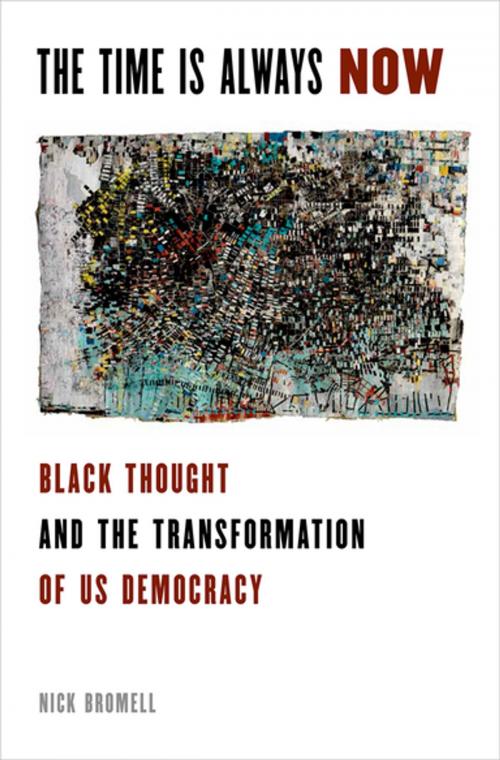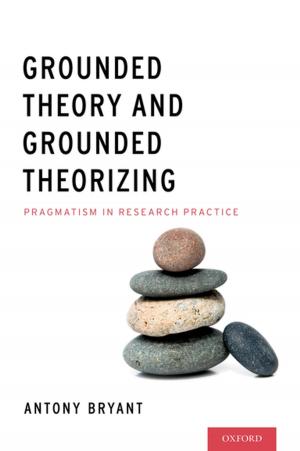The Time is Always Now
Black Thought and the Transformation of US Democracy
Nonfiction, Social & Cultural Studies, Political Science, Politics, Civil Rights, Social Science, Cultural Studies, African-American Studies, History & Theory| Author: | Nick Bromell | ISBN: | 9780199973453 |
| Publisher: | Oxford University Press | Publication: | September 4, 2013 |
| Imprint: | Oxford University Press | Language: | English |
| Author: | Nick Bromell |
| ISBN: | 9780199973453 |
| Publisher: | Oxford University Press |
| Publication: | September 4, 2013 |
| Imprint: | Oxford University Press |
| Language: | English |
"Why," asks Nick Bromell, "should the political thought of white Americans remain the only theory to which Americans of all ethnicities turn when constructing and reconstructing their understanding of democracy? Must Americans remain locked in an apartheid of experience and perception even after whites have become a minority population in this nation? Hasn't the 2012 presidential election made clear that the time has come to build not just on the votes of citizens of color, but on the varieties of democratic thought their experience has engendered?" In his answers to these questions, Bromell brings to light an underappreciated stream of democratic reflection by black writers and activists from David Walker to Malcolm X. Bromell argues that these thinkers urge Americans to fundamentally re-imagine the nature of their democracy and recognize that indignation can be a powerful and productive democratic emotion; that dignity is just as important to democracy as equality and liberty; that national citizenship can be infused with a sense of responsibility to the world; and that faith can actually promote rather than threaten democratic pluralism. A literary critic and intellectual historian, Bromell draws on a wide range of fiction, essays, speeches, and oral histories, deftly synthesizing recent work in U.S. history, literary and cultural studies, and political theory. Like the figures he discusses, he puts this thought to work in the present moment, this "now." Black democratic insights, he shows, are strikingly relevant to the challenges facing US democracy today, and they provide the basis for a new, post-liberal public philosophy with which to turn back the rise of radical conservatism. Historian Robin D.G. Kelley writes: "In this work of enormous breadth, depth, and imagination, Nick Bromell makes what may be the most original contribution to political theory in the past decade. In this age of alleged color blindness, Bromell has the vision and the chutzpah to turn to African American thought-ideas born of struggle, anchored in questions of dignity, human relationships, and faith-in order to revitalize American democracy. "
"Why," asks Nick Bromell, "should the political thought of white Americans remain the only theory to which Americans of all ethnicities turn when constructing and reconstructing their understanding of democracy? Must Americans remain locked in an apartheid of experience and perception even after whites have become a minority population in this nation? Hasn't the 2012 presidential election made clear that the time has come to build not just on the votes of citizens of color, but on the varieties of democratic thought their experience has engendered?" In his answers to these questions, Bromell brings to light an underappreciated stream of democratic reflection by black writers and activists from David Walker to Malcolm X. Bromell argues that these thinkers urge Americans to fundamentally re-imagine the nature of their democracy and recognize that indignation can be a powerful and productive democratic emotion; that dignity is just as important to democracy as equality and liberty; that national citizenship can be infused with a sense of responsibility to the world; and that faith can actually promote rather than threaten democratic pluralism. A literary critic and intellectual historian, Bromell draws on a wide range of fiction, essays, speeches, and oral histories, deftly synthesizing recent work in U.S. history, literary and cultural studies, and political theory. Like the figures he discusses, he puts this thought to work in the present moment, this "now." Black democratic insights, he shows, are strikingly relevant to the challenges facing US democracy today, and they provide the basis for a new, post-liberal public philosophy with which to turn back the rise of radical conservatism. Historian Robin D.G. Kelley writes: "In this work of enormous breadth, depth, and imagination, Nick Bromell makes what may be the most original contribution to political theory in the past decade. In this age of alleged color blindness, Bromell has the vision and the chutzpah to turn to African American thought-ideas born of struggle, anchored in questions of dignity, human relationships, and faith-in order to revitalize American democracy. "















